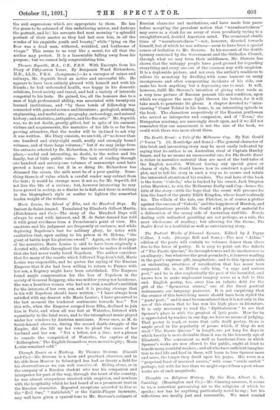Through Russia on a Mustang. By Thomas Stevens. (Cassell and
Co.)—Mr. Stevens is a keen and practised observer, and in his ride from Moscow to Sebastopol has had as dreary a field for his observations as we can well conceive of. Riding alone, or in the company of a Russian student who was his companion and interpreter for part of the way, through the heart of the country, he was almost everywhere received with suspicion, and nowhere with the hospitality which he had heard of as a prominent trait in the Russian character. Repeated receptions accorded to him as the "Evil One," "Antichrist," or the Cattle-Plague incarnate, may well have given a cynical tone to Mr. Stevens's estimate of
Russian character and institutions, and have made him pause before accepting the prevalent notion that " warmheartedness " may serve as a cloak for an array of vices peculiarly trying to a straightforward, decided American mind. The occasional ebulli- tions of "warmheartedness "—not, however, directed towards himself, but of which be was witness—seem to have been a special source of irritation to Mr. Stevens. In his account of the double tyranny exercised by the Government and the Orthodox Church, through what we may term their middlemen, Mr. Stevens has shown that the unhappy people have good ground for regarding everything and every one out of the common way with suspicion. It is a deplorable picture, and not even the author's readiness to relieve its monotony by dwelling with some humour on many incongruous and often exasperating incidents of his ride, can make his book anything but a depressing one to read. It will, however, fulfil Mr. Stevens's intention of giving what reads as a very true picture of Russian peasant life and condition, upon which we suppose the more light thrown the better, for it will take much to penetrate its gloom. A chapter devoted to " inter- viewing" Count Tolstoi in his home, is an interesting episode in the book. The characters respectively of the Russian gentleman who served as interpreter and companion, and of ' Texas,' the Hungarian mustang, are amusingly dwelt upon, and if wo did not remember that our amusement is not the aim of the book, we could wish there was more about them.


































 Previous page
Previous page